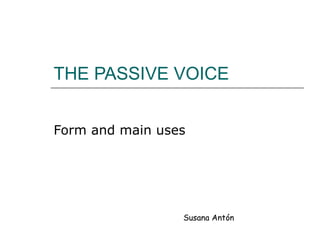The Passive Voice
•Transferir como PPT, PDF•
20 gostaram•12,602 visualizações
This is a powerpoint of the passive voice
Denunciar
Compartilhar
Denunciar
Compartilhar

Mais conteúdo relacionado
Mais procurados
Mais procurados (20)
Destaque (20)
Semelhante a The Passive Voice
Semelhante a The Passive Voice (20)
Último
Making communications land - Are they received and understood as intended? we...

Making communications land - Are they received and understood as intended? we...Association for Project Management
80 ĐỀ THI THỬ TUYỂN SINH TIẾNG ANH VÀO 10 SỞ GD – ĐT THÀNH PHỐ HỒ CHÍ MINH NĂ...

80 ĐỀ THI THỬ TUYỂN SINH TIẾNG ANH VÀO 10 SỞ GD – ĐT THÀNH PHỐ HỒ CHÍ MINH NĂ...Nguyen Thanh Tu Collection
Último (20)
Making communications land - Are they received and understood as intended? we...

Making communications land - Are they received and understood as intended? we...
Python Notes for mca i year students osmania university.docx

Python Notes for mca i year students osmania university.docx
Unit-V; Pricing (Pharma Marketing Management).pptx

Unit-V; Pricing (Pharma Marketing Management).pptx
80 ĐỀ THI THỬ TUYỂN SINH TIẾNG ANH VÀO 10 SỞ GD – ĐT THÀNH PHỐ HỒ CHÍ MINH NĂ...

80 ĐỀ THI THỬ TUYỂN SINH TIẾNG ANH VÀO 10 SỞ GD – ĐT THÀNH PHỐ HỒ CHÍ MINH NĂ...
This PowerPoint helps students to consider the concept of infinity.

This PowerPoint helps students to consider the concept of infinity.
Basic Civil Engineering first year Notes- Chapter 4 Building.pptx

Basic Civil Engineering first year Notes- Chapter 4 Building.pptx
The Passive Voice
- 1. THE PASSIVE VOICE Form and main uses Susana Antón
- 5. 1. Passive forms 1.2. Passive verb forms a letter. would write Rita Active Conditional I by Rita. would be written A letter Passive by Rita. would have been written A letter Passive a letter. would have written Rita Active Conditional II by Rita. will have been written A letter Passive a letter. will have written Rita Active Future Perfect by Rita. had been written A letter Passive a letter. had written Rita Active Past Perfect by Rita. was being written A letter Passive a letter. was writing Rita Active Past Progressive by Rita. is being written A letter Passive a letter. is writing Rita Active Present Progressive Object Verb Subject Tense